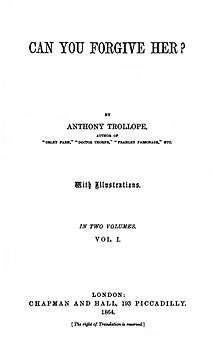Can You Forgive Her?
 First edition title page | |
| Author | Anthony Trollope |
|---|---|
| Illustrator | Hablot Knight Browne (Phiz) & Miss E Taylor[1] |
| Country | England |
| Language | English |
| Series | Palliser |
| Subject | Victorian English life |
| Genre | Novel |
| Publisher | Chapman & Hall[1] |
Publication date | September 1864 (Vol. I) & July 1865 (Vol. II)[1] |
| Media type | Print (hardback) |
| Followed by | Phineas Finn |
Can You Forgive Her? is a novel by Anthony Trollope, first published in serial form in 1864 and 1865. It is the first of six novels in the "Palliser" series.
The novel follows three parallel stories of courtship and marriage and the decisions of three strong women: Alice Vavasor, her cousin Glencora Palliser, and her aunt Arabella Greenow. Early on, Alice asks the question "What should a woman do with her life?" This theme repeats itself in the dilemmas faced by the other women in the novel. Lady Glencora and her husband Plantagenet Palliser recur in the remainder of the Palliser series.
The satirical periodical Punch mocked the work, referring to it as Can You Stand Her? due to its writers' irritation at Alice's ineptitude in deciding between her two suitors. Another commentator[2] pokes fun at the book's length, joking that for modern audiences a more appropriate title might be Can You Possibly Finish It?
Plot
Alice Vavasor, a young woman of twenty-four, is engaged to the wealthy and respectable and dependable, if unambitious and bland, John Grey. She had previously been engaged to her cousin George, but she broke it off after he went through a wild period. John, trusting in his love, makes only the slightest protest of Alice’s planned tour of Switzerland with her cousin Kate, George's sister, even when he learns George is to go with them as male protector. Influenced by the romance of Switzerland, Kate's contriving to restore George to Alice's favour, and her own misgivings with John's shortcomings, Alice jilts her second fiancé.
Alice's noble but despised relations are shocked, but their protests only strengthen Alice's resolve, and she eventually renews her engagement to George, who seems charismatic, ambitious and alluring, in contrast to John. Then George's darker side becomes increasingly visible. He starts asking for money from Alice to support his parliamentary ambitions. Ever attentive to Alice's welfare, John secretly pays the money instead. George wins his first election, but loses his second and in despair and, after learning of John's interference in his campaign and engagement, almost murders John before escaping to America.
A second story involves the comic rivalry between the wealthy farmer Cheesacre and the pauper soldier Captain Bellfield for the affections (and substantial inheritance) of the widow Mrs Greenow. Mrs Greenow had married young to a very rich older man who had recently died. Still in mourning, which for her involves a great deal of performance, she also enjoys basking in the attentions of her beaux and pitting them against each other. Finally she decides to marry the more attractive Captain Bellfield, knowing that she can keep him under control.
The third story deals with the marriage of the extremely rich Plantagenet Palliser to the even wealthier heiress, Lady Glencora M'Cluskie. They are not very well suited. He is a stiff-necked, hardworking politician in line to be Chancellor of the Exchequer, while she has a lively, fun-loving personality and a well-developed sense of humour. She is outspoken and often shocks Alice by her frankness. The marital situation is made more tense by Glencora's failure to conceive a child. Previously, she had been engaged to Burgo Fitzgerald, an aristocratic wastrel, but the same noble relations that protested Alice's jilt had successfully pressured Glencora to abandon Burgo to marry Plantagenet. But she is still passionately in love with Burgo, who plots to elope with Glencora. To Alice's dismay, Glencora argues that it would be for the best if she eloped with Burgo as then Plantagenet could divorce her and marry someone else who could give him children. She publicly dances with Burgo at a ball and nearly agrees to go with him, even at the risk of her fortune and reputation.
Plantagenet sacrifices his political ambitions to save his marriage by taking Glencora on a European tour with Alice accompanying. After some rancorous travelling, Glencora finds that she is pregnant, which solidifies her marriage and fulfills Plantagenet's life, though it is clear that Glencora does not love him. John Grey pursues Alice to Switzerland to renew his courtship and eventually wins her over again. Although Alice loves him, her acceptance of him is not whole-hearted and is described in terms of a surrender. Having jilted him before, she struggles to forgive herself and feels she is unworthy of him. She finally relents, noting that he had "left her no alternative but to be happy." They become engaged and Plantagenet persuades his new friend to run for Parliament. Alice is somewhat pleased by this as she had been dissatisfied with John's earlier lack of ambition.
Back in England, Mrs Greenow marries Bellfield, Glencora gives birth to a son, and Alice finally marries John. Alice’s happiness is temporarily alloyed by sense of defeat at having her wedding turned into a formal social event where she endures the reproachful lectures of high-ranking relatives she had sought to avoid. Trollope suggests that she is fortunate not to have suffered more by trying to defy social convention.
References
- 1 2 3 Moody, Ellen (2003), Anthony Trollope's Writing Life: A Chronology, Jim & Ellen Moody.
- ↑ King, Stephen (2000), On Writing, London.
External links
- Can You Forgive Her? at Project Gutenberg
-
 Can You Forgive Her? public domain audiobook at LibriVox
Can You Forgive Her? public domain audiobook at LibriVox